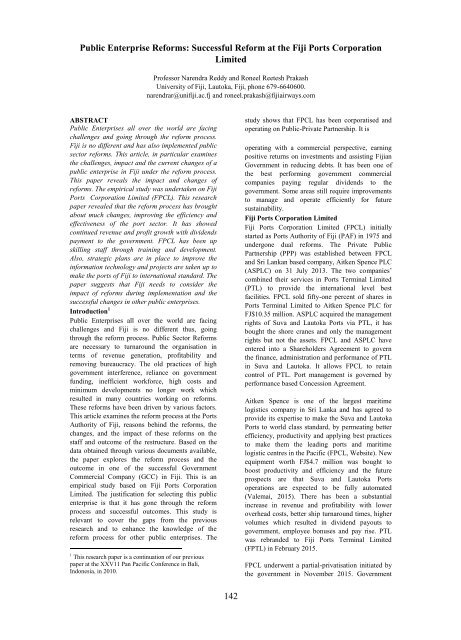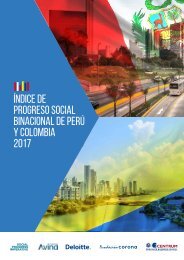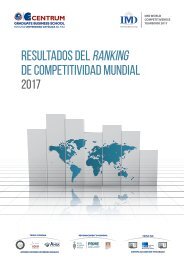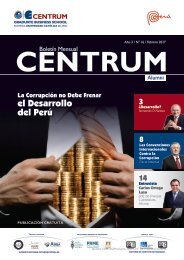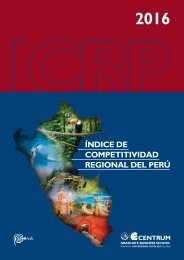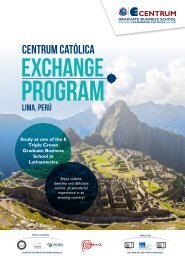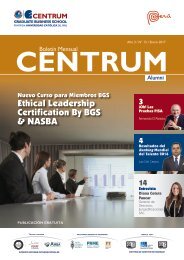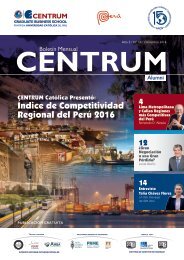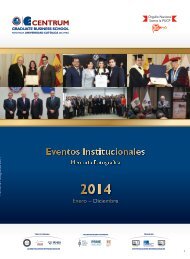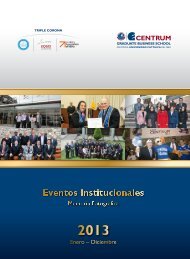Pan-Pacific Conference XXXIV. Designing New Business Models in Developing Economies
This publication represents the Proceedings of the 34th Annual Pan-Pacific Conference being held in Lima, Peru May 29-31, 2017. The Pan-Pacific Conference has served as an important forum for the exchange of ideas and information for promoting understanding and cooperation among the peoples of the world since 1984. Last year, we had a memorable conference in Miri, Malaysia, in cooperation with Curtin University Sarawak, under the theme of “Building a Smart Society through Innovation and Co-creation.” Professor Pauline Ho served as Chair of the Local Organizing Committee, with strong leadership support of Pro Vice-Chancellor Professor Jim Mienczakowski and Dean Jonathan Winterton.
This publication represents the Proceedings of the 34th Annual Pan-Pacific Conference being held in Lima, Peru May 29-31, 2017. The Pan-Pacific Conference has served as an important forum for the exchange of ideas and information for promoting understanding and cooperation among the peoples of the world since 1984. Last year, we had a memorable conference in Miri, Malaysia, in cooperation with Curtin University Sarawak, under the theme of “Building a Smart Society through Innovation and Co-creation.” Professor Pauline Ho served as Chair of the Local Organizing Committee, with strong leadership support of Pro Vice-Chancellor Professor Jim Mienczakowski and Dean Jonathan Winterton.
You also want an ePaper? Increase the reach of your titles
YUMPU automatically turns print PDFs into web optimized ePapers that Google loves.
Public Enterprise Reforms: Successful Reform at the Fiji Ports Corporation<br />
Limited<br />
Professor Narendra Reddy and Roneel Reetesh Prakash<br />
University of Fiji, Lautoka, Fiji, phone 679-6640600.<br />
narendrar@unifiji.ac.fj and roneel.prakash@fijiairways.com<br />
ABSTRACT<br />
Public Enterprises all over the world are fac<strong>in</strong>g<br />
challenges and go<strong>in</strong>g through the reform process.<br />
Fiji is no different and has also implemented public<br />
sector reforms. This article, <strong>in</strong> particular exam<strong>in</strong>es<br />
the challenges, impact and the current changes of a<br />
public enterprise <strong>in</strong> Fiji under the reform process.<br />
This paper reveals the impact and changes of<br />
reforms. The empirical study was undertaken on Fiji<br />
Ports Corporation Limited (FPCL). This research<br />
paper revealed that the reform process has brought<br />
about much changes, improv<strong>in</strong>g the efficiency and<br />
effectiveness of the port sector. It has showed<br />
cont<strong>in</strong>ued revenue and profit growth with dividends<br />
payment to the government. FPCL has been up<br />
skill<strong>in</strong>g staff through tra<strong>in</strong><strong>in</strong>g and development.<br />
Also, strategic plans are <strong>in</strong> place to improve the<br />
<strong>in</strong>formation technology and projects are taken up to<br />
make the ports of Fiji to <strong>in</strong>ternational standard. The<br />
paper suggests that Fiji needs to consider the<br />
impact of reforms dur<strong>in</strong>g implementation and the<br />
successful changes <strong>in</strong> other public enterprises.<br />
Introduction 1<br />
Public Enterprises all over the world are fac<strong>in</strong>g<br />
challenges and Fiji is no different thus, go<strong>in</strong>g<br />
through the reform process. Public Sector Reforms<br />
are necessary to turnaround the organisation <strong>in</strong><br />
terms of revenue generation, profitability and<br />
remov<strong>in</strong>g bureaucracy. The old practices of high<br />
government <strong>in</strong>terference, reliance on government<br />
fund<strong>in</strong>g, <strong>in</strong>efficient workforce, high costs and<br />
m<strong>in</strong>imum developments no longer work which<br />
resulted <strong>in</strong> many countries work<strong>in</strong>g on reforms.<br />
These reforms have been driven by various factors.<br />
This article exam<strong>in</strong>es the reform process at the Ports<br />
Authority of Fiji, reasons beh<strong>in</strong>d the reforms, the<br />
changes, and the impact of these reforms on the<br />
staff and outcome of the restructure. Based on the<br />
data obta<strong>in</strong>ed through various documents available,<br />
the paper explores the reform process and the<br />
outcome <strong>in</strong> one of the successful Government<br />
Commercial Company (GCC) <strong>in</strong> Fiji. This is an<br />
empirical study based on Fiji Ports Corporation<br />
Limited. The justification for select<strong>in</strong>g this public<br />
enterprise is that it has gone through the reform<br />
process and successful outcomes. This study is<br />
relevant to cover the gaps from the previous<br />
research and to enhance the knowledge of the<br />
reform process for other public enterprises. The<br />
1 This research paper is a cont<strong>in</strong>uation of our previous<br />
paper at the XXV11 <strong>Pan</strong> <strong>Pacific</strong> <strong>Conference</strong> <strong>in</strong> Bali,<br />
Indonesia, <strong>in</strong> 2010.<br />
study shows that FPCL has been corporatised and<br />
operat<strong>in</strong>g on Public-Private Partnership. It is<br />
operat<strong>in</strong>g with a commercial perspective, earn<strong>in</strong>g<br />
positive returns on <strong>in</strong>vestments and assist<strong>in</strong>g Fijian<br />
Government <strong>in</strong> reduc<strong>in</strong>g debts. It has been one of<br />
the best perform<strong>in</strong>g government commercial<br />
companies pay<strong>in</strong>g regular dividends to the<br />
government. Some areas still require improvements<br />
to manage and operate efficiently for future<br />
susta<strong>in</strong>ability.<br />
Fiji Ports Corporation Limited<br />
Fiji Ports Corporation Limited (FPCL) <strong>in</strong>itially<br />
started as Ports Authority of Fiji (PAF) <strong>in</strong> 1975 and<br />
undergone dual reforms. The Private Public<br />
Partnership (PPP) was established between FPCL<br />
and Sri Lankan based company, Aitken Spence PLC<br />
(ASPLC) on 31 July 2013. The two companies’<br />
comb<strong>in</strong>ed their services <strong>in</strong> Ports Term<strong>in</strong>al Limited<br />
(PTL) to provide the <strong>in</strong>ternational level best<br />
facilities. FPCL sold fifty-one percent of shares <strong>in</strong><br />
Ports Term<strong>in</strong>al Limited to Aitken Spence PLC for<br />
FJ$10.35 million. ASPLC acquired the management<br />
rights of Suva and Lautoka Ports via PTL, it has<br />
bought the shore cranes and only the management<br />
rights but not the assets. FPCL and ASPLC have<br />
entered <strong>in</strong>to a Shareholders Agreement to govern<br />
the f<strong>in</strong>ance, adm<strong>in</strong>istration and performance of PTL<br />
<strong>in</strong> Suva and Lautoka. It allows FPCL to reta<strong>in</strong><br />
control of PTL. Port management is governed by<br />
performance based Concession Agreement.<br />
Aitken Spence is one of the largest maritime<br />
logistics company <strong>in</strong> Sri Lanka and has agreed to<br />
provide its expertise to make the Suva and Lautoka<br />
Ports to world class standard, by permeat<strong>in</strong>g better<br />
efficiency, productivity and apply<strong>in</strong>g best practices<br />
to make them the lead<strong>in</strong>g ports and maritime<br />
logistic centres <strong>in</strong> the <strong>Pacific</strong> (FPCL, Website). <strong>New</strong><br />
equipment worth FJ$4.7 million was bought to<br />
boost productivity and efficiency and the future<br />
prospects are that Suva and Lautoka Ports<br />
operations are expected to be fully automated<br />
(Valemai, 2015). There has been a substantial<br />
<strong>in</strong>crease <strong>in</strong> revenue and profitability with lower<br />
overhead costs, better ship turnaround times, higher<br />
volumes which resulted <strong>in</strong> dividend payouts to<br />
government, employee bonuses and pay rise. PTL<br />
was rebranded to Fiji Ports Term<strong>in</strong>al Limited<br />
(FPTL) <strong>in</strong> February 2015.<br />
FPCL underwent a partial-privatisation <strong>in</strong>itiated by<br />
the government <strong>in</strong> November 2015. Government<br />
142


